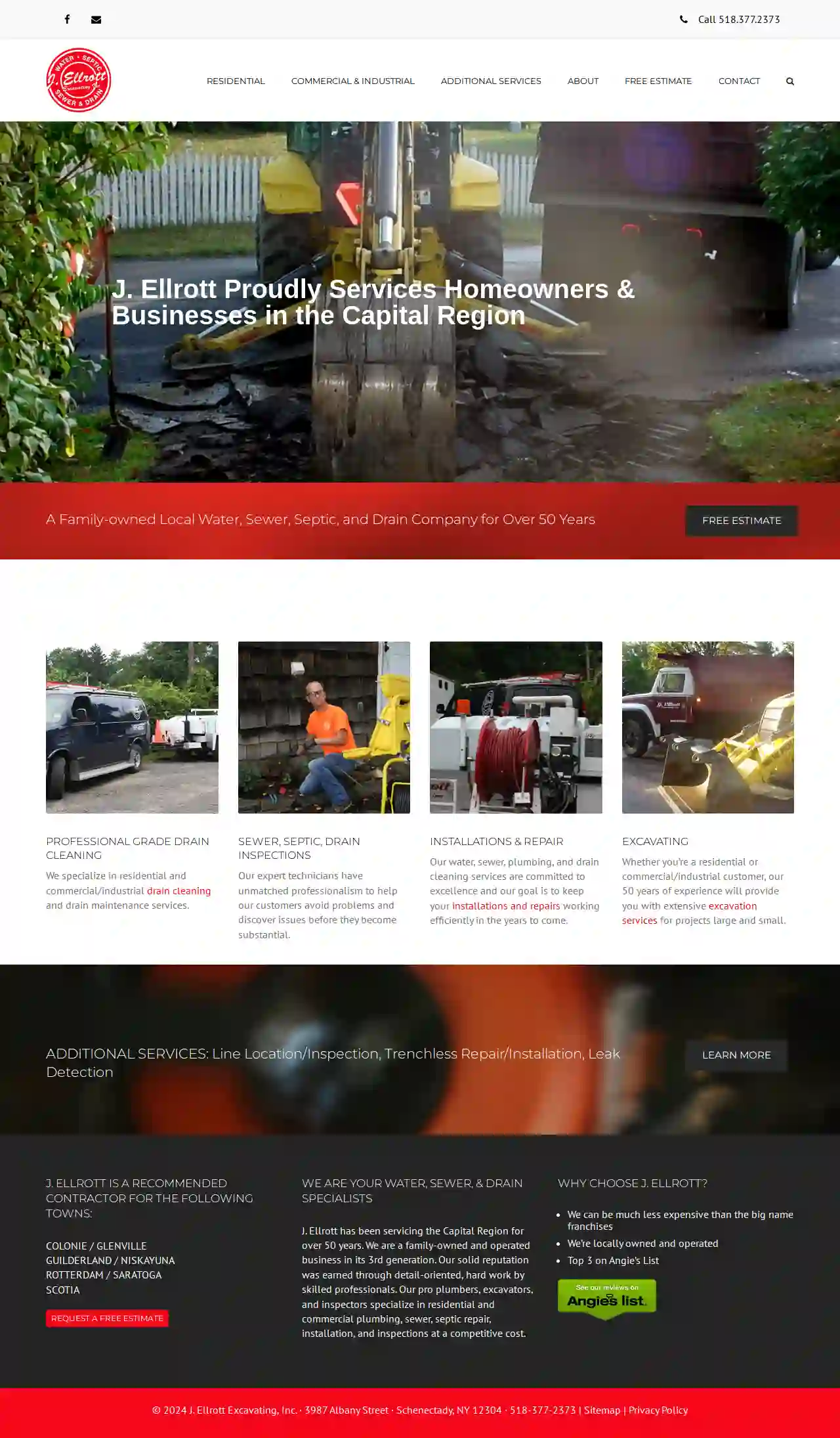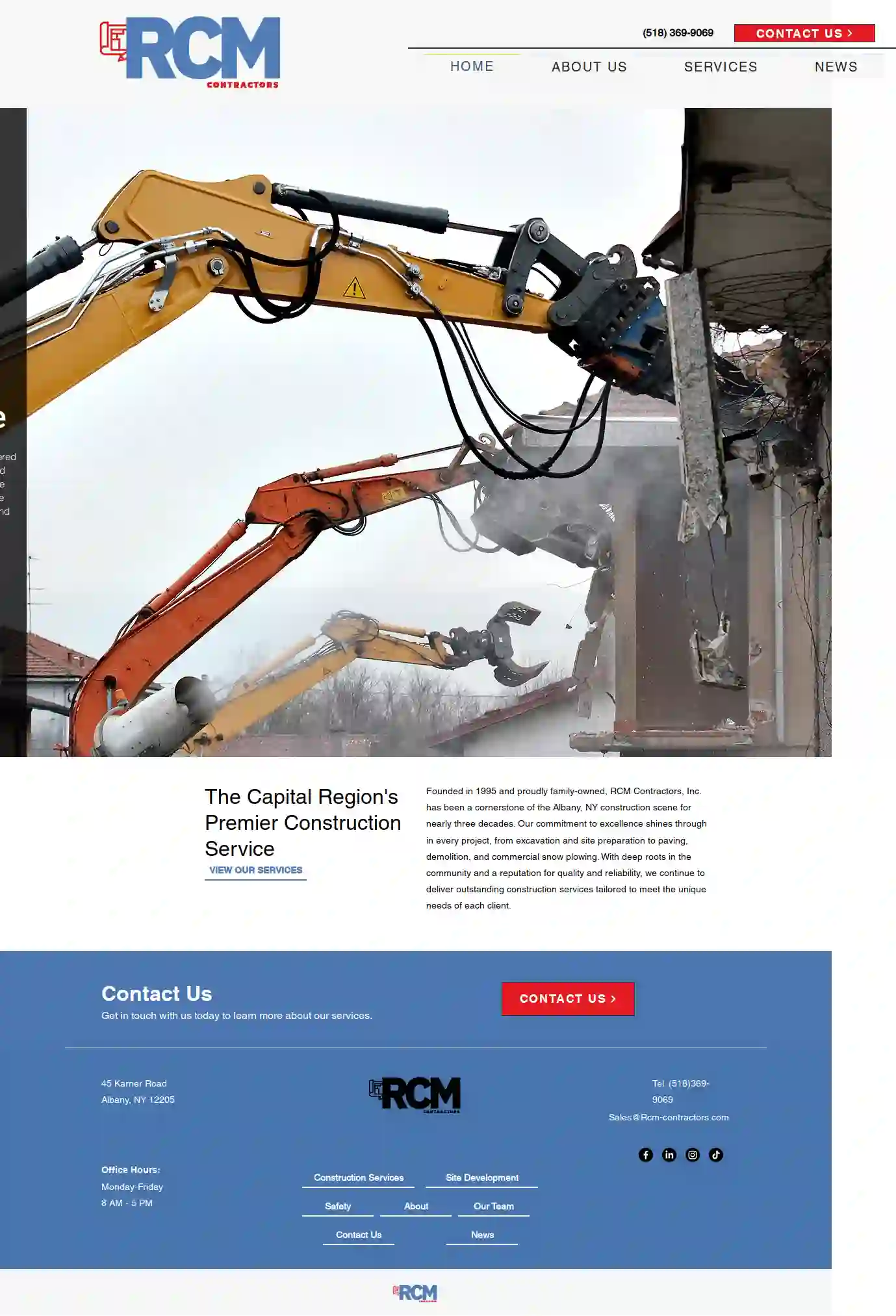Demolition Contractors Albany
Find the best Demolition Contractors Near Me in Albany
Receive up to 3 Demolition Contractors quotes for your project today! Compare profiles, reviews, accreditations, portfolio, etc... and choose the best offer.

J Ellrott Excavating
3987 Albany Street, Schenectady, 12304, USJ. Ellrott Proudly Services Homeowners & Businesses in the Capital Region → Drain Cleaning → Installations & Repairs → Plumbing → Excavation → Inspections → & More Three Generations Strong for Over 50 Years A Family-owned Local Water, Sewer, Septic, and Drain Company for Over 50 Years FREE ESTIMATE We specialize in residential and commercial/industrial drain cleaning and drain maintenance services. PROFESSIONAL GRADE DRAIN CLEANING Emergency and pre-scheduled maintenance Trenchless Installation Install your water or replace your sewer without destroying your lawn or driveway! SEWER, SEPTIC, DRAIN INSPECTIONS Our expert technicians have unmatched professionalism to help our customers avoid problems and discover issues before they become substantial. INSTALLATIONS & REPAIR Our water, sewer, plumbing, and drain cleaning services are committed to excellence and our goal is to keep your installations and repairs working efficiently in the years to come. EXCAVATING Whether you’re a residential or commercial/industrial customer, our 50 years of experience will provide you with extensive excavation services for projects large and small. ADDITIONAL SERVICES: Line Location/Inspection, Trenchless Repair/Installation, Leak Detection LEARN MORE
- Services
- Why Us?
- Gallery
Get Quote
Albany Excavation and Concrete
54 reviews1234 Winchester Blvd., Campbell, USAlbany Excavation and Concrete A Division of A.P Concrete LLC Albany Excavation and Concrete services Albany, Troy, Schenectady New York and surrounding areas. Make us your first call for all things stamped concrete, retaining walls, concrete steps, residential drainage....you name it! When you call us you get Free Estimates Skilled tradesmen Value oriented pricing And finished product that will last! Call Us Today for a FREE Estimate!
- Services
- Why Us?
- Gallery
Get Quote
RCM Contractors Excavation, Demolition & Land Development Albany
45 Karner Road, Albany, 12205, USOur Story Founded in 1995 and proudly family-owned, RCM Contractors, Inc. has been a cornerstone of the Albany, NY construction scene for nearly three decades. Our commitment to excellence shines through in every project, from excavation and site preparation to paving, demolition, and commercial snow plowing. With deep roots in the community and a reputation for quality and reliability, we continue to deliver outstanding construction services tailored to meet the unique needs of each client.
- Services
- Why Us?
- Gallery
Get Quote
DIRT BOSS Excavating
53 reviewsAlbany, USAbout YouTube Our mission is to give everyone a voice and show them the world. We believe that everyone deserves to have a voice, and that the world is a better place when we listen, share and build community through our stories.
- Services
- Why Us?
- Gallery
Get Quote
Albany Excavation and Concrete
Albany, US- Services
- Why Us?
Get Quote- Ni
Nick Lussier's Excavating, LLC
58 reviewsAlbany, US- Services
- Why Us?
Get Quote - Ja
Jake Burnett Excavating Inc
4.69 reviewsAlbany, US- Services
- Why Us?
Get Quote 
Badolato Excavation
4.944 reviewsAlbany, US- Services
- Why Us?
Get Quote- Ex
Excacvation Albany NY
Albany, US- Services
- Why Us?
Get Quote
Over 22,076+ Excavation Pros in our network
Our excavation contractors operate in Albany & surrounding areas!
ExcavationHQ has curated and vetted the Best Excavation Pros near Albany. Find a top & trustworthy contractor today.
Frequently Asked Questions About Demolition Contractors
- Safety: Experienced contractors have the knowledge, skills, and safety training to execute demolitions safely, minimizing risks to workers and surrounding areas.
- Efficiency: Contractors have the specialized equipment and expertise to complete demolitions efficiently, saving time and reducing project costs.
- Compliance: Reputable contractors are familiar with local regulations and permitting requirements, ensuring compliance and avoiding legal issues.
- Waste Management: Contractors have waste management plans to handle debris responsibly, including recycling and proper disposal.
- Liability Protection: Insured contractors protect you from financial responsibility for accidents or damages during the demolition process.
- 'Can I see proof of your licensing and insurance?' Verify their credentials and coverage.
- 'What experience do you have with projects like mine?' Ensure they have relevant expertise.
- 'Can you provide references from past clients?' Check their reputation and customer satisfaction.
- 'What are your safety protocols?' Prioritize contractors who emphasize safety.
- 'How will you handle hazardous materials?' Ensure they have proper procedures for asbestos or lead abatement.
- 'What is your timeline for completing the project?' Understand the project duration.
- 'How will you manage noise, dust, and debris?' Discuss mitigation measures for minimizing disruption.
- 'What are your payment terms?' Clarify payment schedules and any required deposits.
- Recycling: Concrete, brick, metal, and wood can be recycled and reused in other construction projects, reducing waste sent to landfills.
- Landfill Disposal: Non-recyclable materials are disposed of in designated landfills according to local regulations.
- Donation: Some materials, such as fixtures or appliances, may be suitable for donation to charitable organizations.
What are the benefits of hiring a professional demolition contractor?
What questions should I ask a demolition contractor before hiring them?
How long does a demolition project take?
What happens to the debris after demolition?
What are the benefits of hiring a professional demolition contractor?
- Safety: Experienced contractors have the knowledge, skills, and safety training to execute demolitions safely, minimizing risks to workers and surrounding areas.
- Efficiency: Contractors have the specialized equipment and expertise to complete demolitions efficiently, saving time and reducing project costs.
- Compliance: Reputable contractors are familiar with local regulations and permitting requirements, ensuring compliance and avoiding legal issues.
- Waste Management: Contractors have waste management plans to handle debris responsibly, including recycling and proper disposal.
- Liability Protection: Insured contractors protect you from financial responsibility for accidents or damages during the demolition process.
What questions should I ask a demolition contractor before hiring them?
- 'Can I see proof of your licensing and insurance?' Verify their credentials and coverage.
- 'What experience do you have with projects like mine?' Ensure they have relevant expertise.
- 'Can you provide references from past clients?' Check their reputation and customer satisfaction.
- 'What are your safety protocols?' Prioritize contractors who emphasize safety.
- 'How will you handle hazardous materials?' Ensure they have proper procedures for asbestos or lead abatement.
- 'What is your timeline for completing the project?' Understand the project duration.
- 'How will you manage noise, dust, and debris?' Discuss mitigation measures for minimizing disruption.
- 'What are your payment terms?' Clarify payment schedules and any required deposits.
How long does a demolition project take?
What happens to the debris after demolition?
- Recycling: Concrete, brick, metal, and wood can be recycled and reused in other construction projects, reducing waste sent to landfills.
- Landfill Disposal: Non-recyclable materials are disposed of in designated landfills according to local regulations.
- Donation: Some materials, such as fixtures or appliances, may be suitable for donation to charitable organizations.